Looking for a flexible way to make money online? Look no further than this guide. Discover how you can find work that fits around your schedule.
Key takeaways
- Flexible work spans diverse options from creative roles (writing, design) to gig economy jobs (ridesharing, delivery) to passive income streams (digital products, courses).
- Many flexible jobs require upfront effort to build momentum, but can later generate income with reduced active work hours.
- Remote and freelance careers like web development and online tutoring offer both schedule flexibility and strong earning potential.
Did you know that there are 76.4 million freelancers in the US? That’s 22.4% of the population!
Those people are making the dream of a flexible lifestyle work. They’re able to make money while staying in control of their schedules.
Here, I’ve put together a list of the most flexible work when you want jobs that are also realistic.
That means I’ve focused on what can genuinely bring you enough income to make a living and allow you to work whenever you want and wherever you want (and they’re not all limited to freelancing).
30 work-when-you-want jobs for ultimate flexibility
1. Clipping

Clipping refers to creating short-form content from existing long-form content of popular content creators. If you've been using TikTok or scrolling in Instagram Reels, you've probably seen some short clips of streamer or YouTuber content. Maybe a clip of a great trade a streamer made or a buzzer-beater a YouTuber made on an NBA 2K video.
Since those clips tend to be the peak moment of streams or videos, they gain a lot of views, thus promoting the original creator. This is a win for the creator - free advertising. But what if you could turn it into a win-win situation, winning alongside the creator?
Since clips are a great way for creators to promote themselves, many of them are looking for what we call 'clippers' to transform their long-form content into multiple short-form videos and share them across social media. In return, they pay the clippers based on the views their videos get.
As a clipper, all you have to do is to take a look at the Content rewards section on Whop, check out the offers and their pay-per-view offer, and start clipping for them. If you want more guidance on how to start clipping, join Whop Clips.
2. Sell digital products

Digital products account for around 3% of US consumer spending. This huge market can give you passive income and total freedom of your schedule - the ultimate dream.
You could sell ebooks, courses, software, digital art, and paid community access. All you need to do is create a product and market it via social media, SEO, or ads. Once the business is rolling, you just sit back and reap the rewards.
If you can make a living from selling digital products, you could lead a flexible life, as the cash comes in regardless of whether you’re actively working or not.
Whop is the ideal place to sell digital products. It takes care of hosting, fulfillment, and payment processing while allowing you to create a highly flexible storefront with apps, chats, forums, subscriptions, and much more. Create your whop, upload your products, and start selling.
3. Dropshipping

Ok, but what if you’re not a digital product creator? Consider dropshipping. With drop shipping, you take a pre-existing product and market it as if it were your own.
You don’t need to worry about manufacturing and delivery, as that’s taken care of by the third party. In exchange, you pay a fee or subscription cost but keep your profit margin. So, a $50 plushie that costs $10 to make will earn you $40.
While it’s a flexible work when you want the job, you’ll still need to grind. We checked out the consensus on Reddit Dropshipping, and most people said they worked 3-5 hours per day with successful products but had to put in full shifts to get the ball rolling.
You can get started with dropshipping sites such as Spocket, SaleHoo, DSers, and Wholesale Central. For expert advice on starting a dropshipping business, check out Whop's dropshipping courses and communities.
- Dropshipping vs ecommerce: what's the difference?
- Best dropshipping niches for launching winning products
- Best dropshipping products for beginners
- Best dropshipping communities
4. Sell courses
Selling online courses brings passive income and the chance to offer other services, such as one-on-one coaching, paid communities, and exclusive digital products.
There will be no one watching your hours, but you’ll need to push hard to create insightful, engaging course content - including videos, resources, and tests.
If you’ve got expertise in any subject and a personality that inspires, then there’s nothing stopping you. You can start on sites like Kajabi or Udemy, but Whop takes things one step further and gives you the ability to offer unparalleled tiered packaging, private communities for your course, and digital products like ebooks and other PDFs, such as worksheets.
- How to sell online courses the easy way (5 step process)
- How to sell training courses online: from choosing a niche to creating a marketing funnel
5. Web developer

Web development is no easy job. You need a deep understanding of HTML, Javascript, and CSS, alongside critical thinking and an eye for design.
But, you get to work from wherever you have a laptop and an internet connection - from home to the Bahamas!
Freelance web developers, in particular, have total flexibility, but even when working for an agency, your efforts are measured by completion rate rather than punching a clock.
Web development can also be lucrative, which is always nice. The average U.S. salary is $93,998, but senior developers can make over $200,000.
Web developer jobs can be found on Upwork, Fiverr, Contra, and Reddit’s For Hire subreddit.
6. Freelance writing

Take it from me firsthand - being a writer is a flexible work when you want job. You need to meet deadlines and make edits for your clients quickly, but generally, you can start when you want and arrange your schedule as you want.
I can work anywhere with my laptop and an internet connection — meaning I can make money anywhere in the world. While most of my time is spent at my desk at home, I’ve even worked on trains and in hotels.
At the busiest of times, I’ve worked 40 hours a week. But when I want to take some time out or focus on my other passions, I’ve been able to reduce it considerably. I’m always in control.
It’s also flexible in terms of niche, with copywriting, content writing, technical writing, and creative writing to choose from.
That said, you’ll still need to put the hours into marketing your skills and finding new clients. But the payoff is worth it.
Writing gigs can be found on Upwork, Fiverr, and LinkedIn. If you want to upskill your writing skills, check out Whop - we have plenty of online courses and communities, including writing-focused options.
- How to make money writing: Expert tips, tools, pay guide & more
- How to start a profitable freelance business from scratch
7. Digital artist
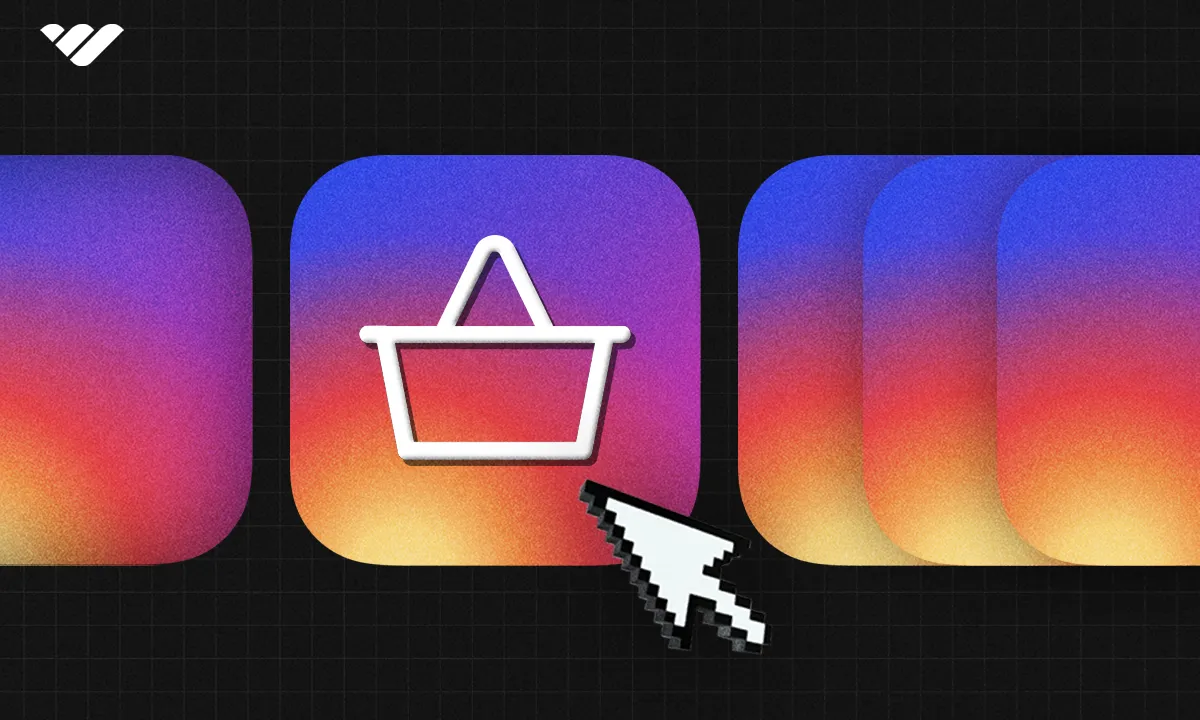
The digital art world offers a route to flexible, profitable creativity for artists. Many can provide passive income.
For example, you could sell your digital art as downloadable images, wallpapers, or messaging sticker packs. Or you could use print-on-demand services to cash in on real-world prints.
There’s also the option of using your skills to train others via online courses or streaming your creative process in exchange for ad revenue or fan contributions.
Your job will likely go in cycles, spending time on creating, marketing, and networking. Again, this is one of those jobs where you’ll need to work hard to make it a success, but later, you can receive income while taking time off.
Digital artists can sell their art on Whop as a downloadable or even create an artist community -why not teach others how to use digital art programs and tools for a membership fee?
8. Graphic designer

Graphic design is another creative field that is suited to freelancers and working wherever and whenever you want.
It’s perfect for anyone with an understanding of marketing and branding, alongside the must-have creative eye.
You’ll be tasked with working for agencies or businesses directly, creating visual designs that are used in emails, products, websites, apps, and printing materials. Depending on your client and brief, you might have total freedom or need to adjust pre-existing designs to help meet their targets.
Graphic designers can find jobs on Upwork, Fiverr, The Design Kids, We Work Remotely, and Design Jobs Board.
Reddit graphic designers report that they tend to work typical 9-5 hours but have the flexibility to take days off or vacations at very short notice.
9. Caregiver

Here’s one for the real world.
Being an independent contractor caregiver might not sound particularly flexible; it’s a very demanding job. But with agencies at sites like Care.com, you can sign up and create a schedule that works for you. You can change it at any time and even reject proposed jobs.
If you’re a confident person, self-started, and accountable for your work quality, then it may be a flexible real-world job suited to you.
10. Online tutor

Online tutoring can be extremely flexible, as you get to decide which hours you’re unavailable for. You can also work pretty much anywhere in the world; though it’s best to work from a laptop, you could even provide feedback from a simple phone video call.
There’s also wide flexibility in the subject you want to teach, from SAT exams to instrument lessons or stock trading.
The e-learning market is projected to be worth over $840 billion by 2030, so making a name for yourself now could have a big payoff in a few years.
You can use your whop as an all-in-one hub for your students to talk together, access course material, and provide suggestions. With the video app to host live lessons, the chat app for your students to talk, the courses app for teaching your students, and the files app for worksheets, Whop is the perfect place to tutor.
Discover how to become an online tutor in this guide.
11. Ridesharing driver
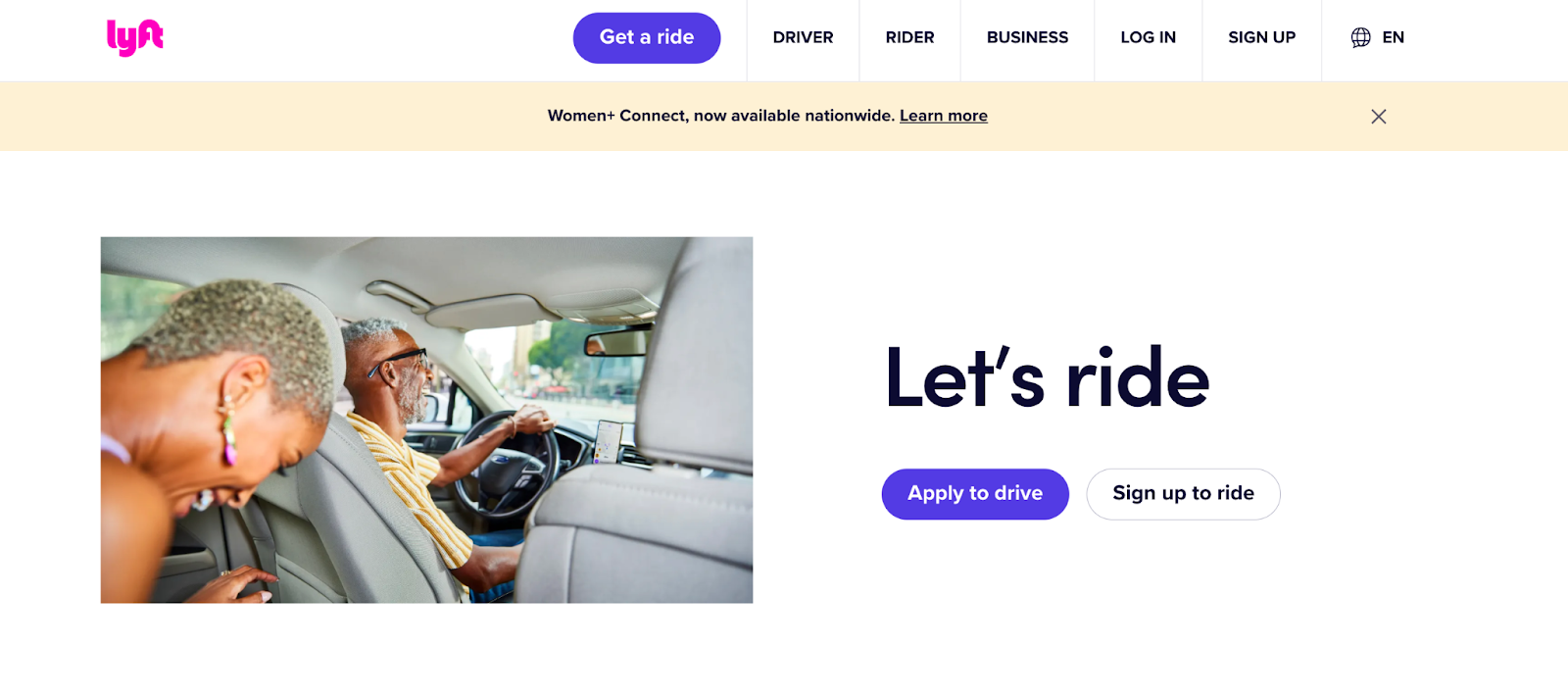
Unlike working for a taxi company, ridesharing companies tend to give you total flexibility over your hours. You can punch in and out as you wish. Want to take that vacation next month? No problem. You also get to work from the comfort of your own car.
Uber is the obvious candidate, but you can also consider Lyft, Curb, Gett, and Wingz. All that’s needed is a car, smartphone, U.S. driver's license, background check, and the appropriate insurance.
On average, full-time drivers put in 9 to 12 hours per day.
12. Food delivery driver
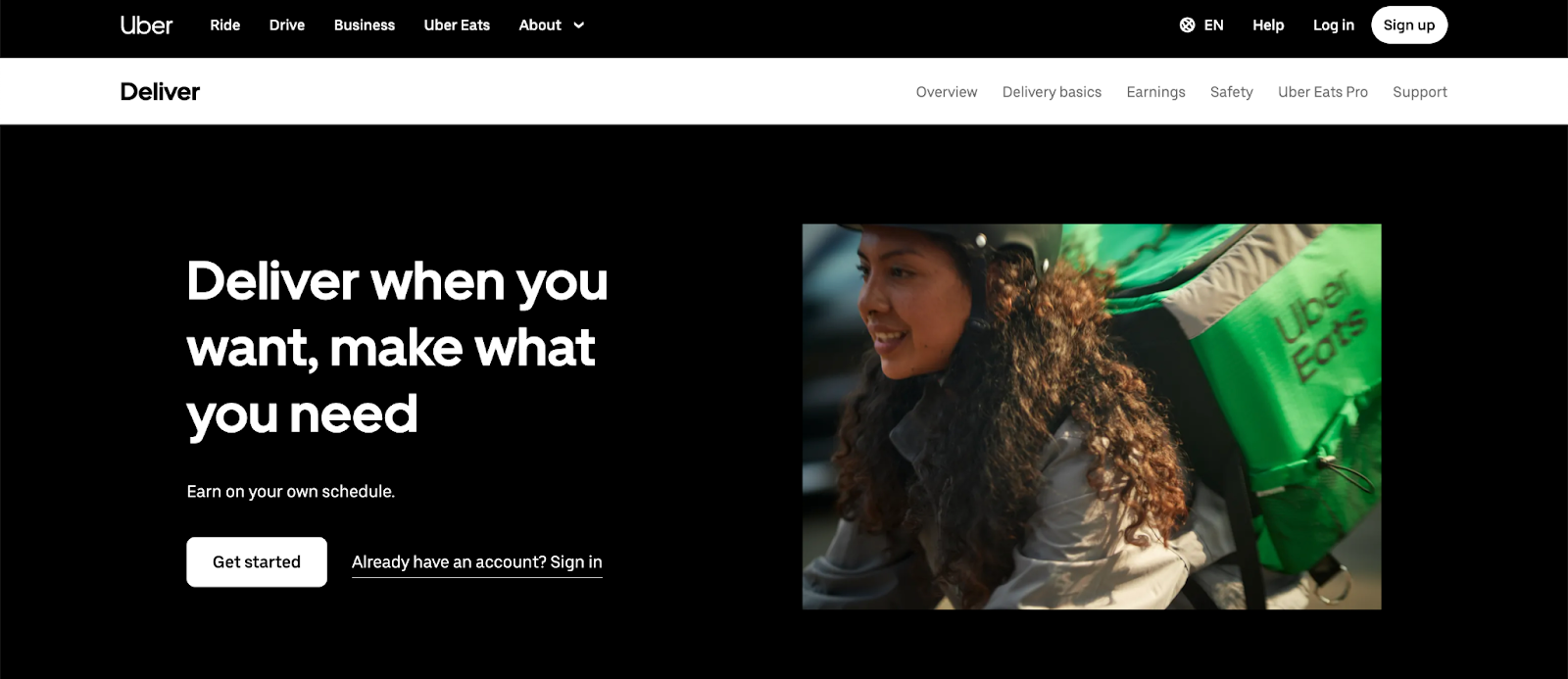
There are well over one million UberEats delivery drivers in the U.S., with many more working for rivals like Doordash, GrubHub, and Deliveroo.
While demanding, it’s flexible, as you can clock in and out as you wish. You can also decide which meals you accept to deliver, determining how far you’ll travel for each fee - you can even work for one hour a week if you want.
Full-time delivery drivers and riders typically work 6 to 8 hours per day.
13. Fitness instructor
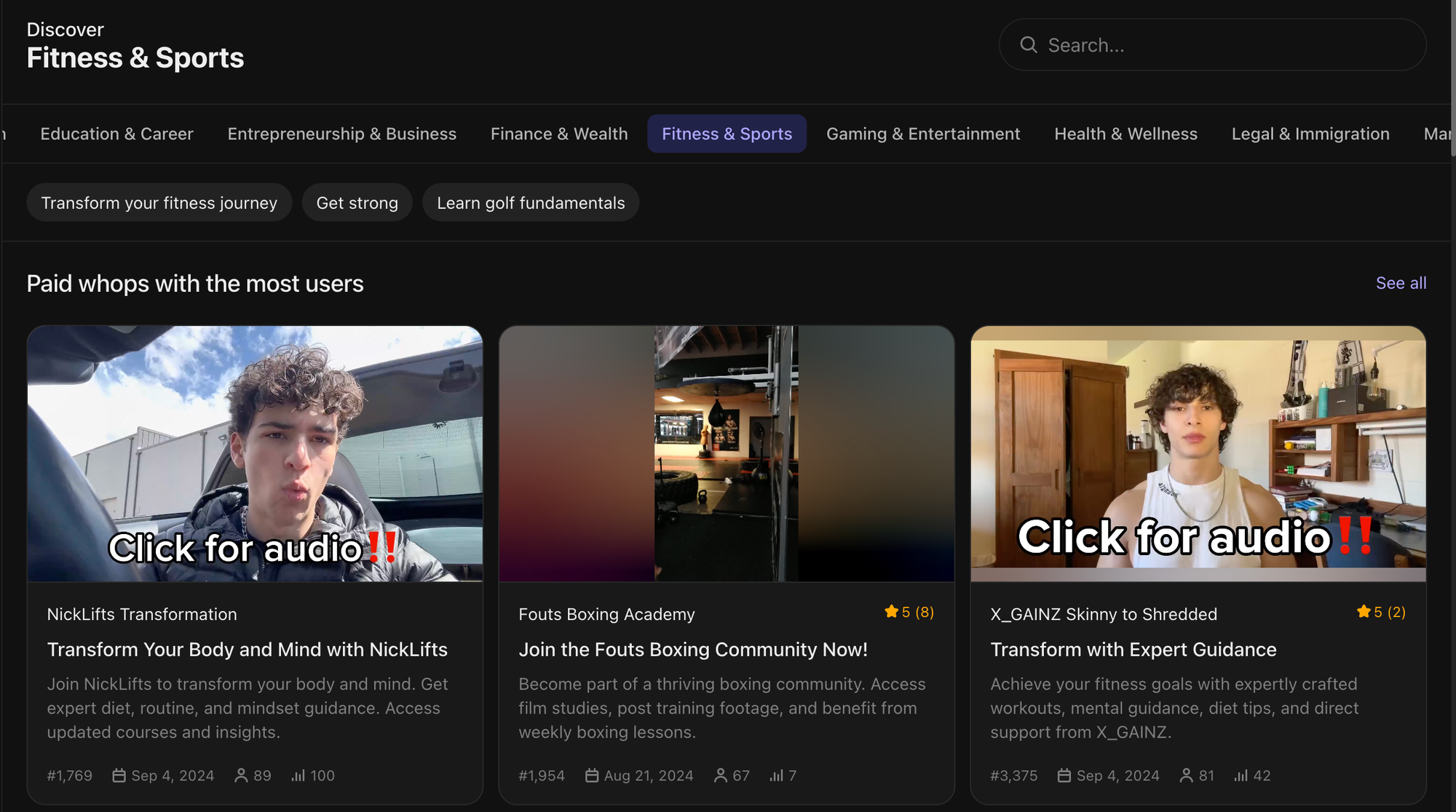
Although most hours revolve around typical working hours (after 5 pm), fitness instructors get to choose when and where they work.
More flexibility can be found through the online fitness industry, which is set to increase by ten times its value in the next eight years. Money can come in a variety of ways, including one-on-one workout calls, paid fitness plans, affiliate marketing, and premium content to your most passionate customers.
Whether you’re working online or offline (or both), consider using your whop to create a community hub, where you can list courses, exclusive content and create a fitness chat or forum.
14. Virtual assistant

Virtual assistants don’t need to be tied to one location, allowing them to work on the move with an internet connection and a cellphone.
The majority of virtual assistant tasks involve organizing schedules, liaising with customers, answering emails and calls, and doing some data entry.
In terms of time demand, you’ll need to be ready to pick up the phone from your client during working hours, but otherwise just need to ensure tasks are completed on time.
Virtual assistant jobs can be found on dedicated sites including Wing Assistant, Prialto, and Fancy Hands.
Most part-time virtual assistants commit just 1 to 5 hours per week and clients, with full-time roles around 20 to 40 hours.
15. Editor

Editors are the generals of the writing world. They ensure that written material hits the goal of the publication and is free from mistakes and readability issues.
In a freelance or contracted position, editors can work when and where they want, so long as deadlines are met and they respond to their team promptly.
Work can be found on LinkedIn, Fiverr, Contra, Upwork, and Reddit.
Freelance editors typically work 20 to 40 hours per week, averaging around 4 to 5 hours per day of focused editing work.
16. Video or audio editor

Video and audio editors are often entrusted to work alone and meet deadlines. There is typically no requirement to work set hours.
Their role is to transform raw footage or audio files into marketable, entertaining, or informative videos, podcasts, or radio shows. Roles can be found in commercials, culture, podcasts, documentaries, and films.
You will, however, likely be working with a director, so you’ll still need to respond on time even if you’re not actively working.
Freelancers typically work around 20 to 40 hours per week, with full-time gigs around 40 to 65 hours per week.
17. Vlogging
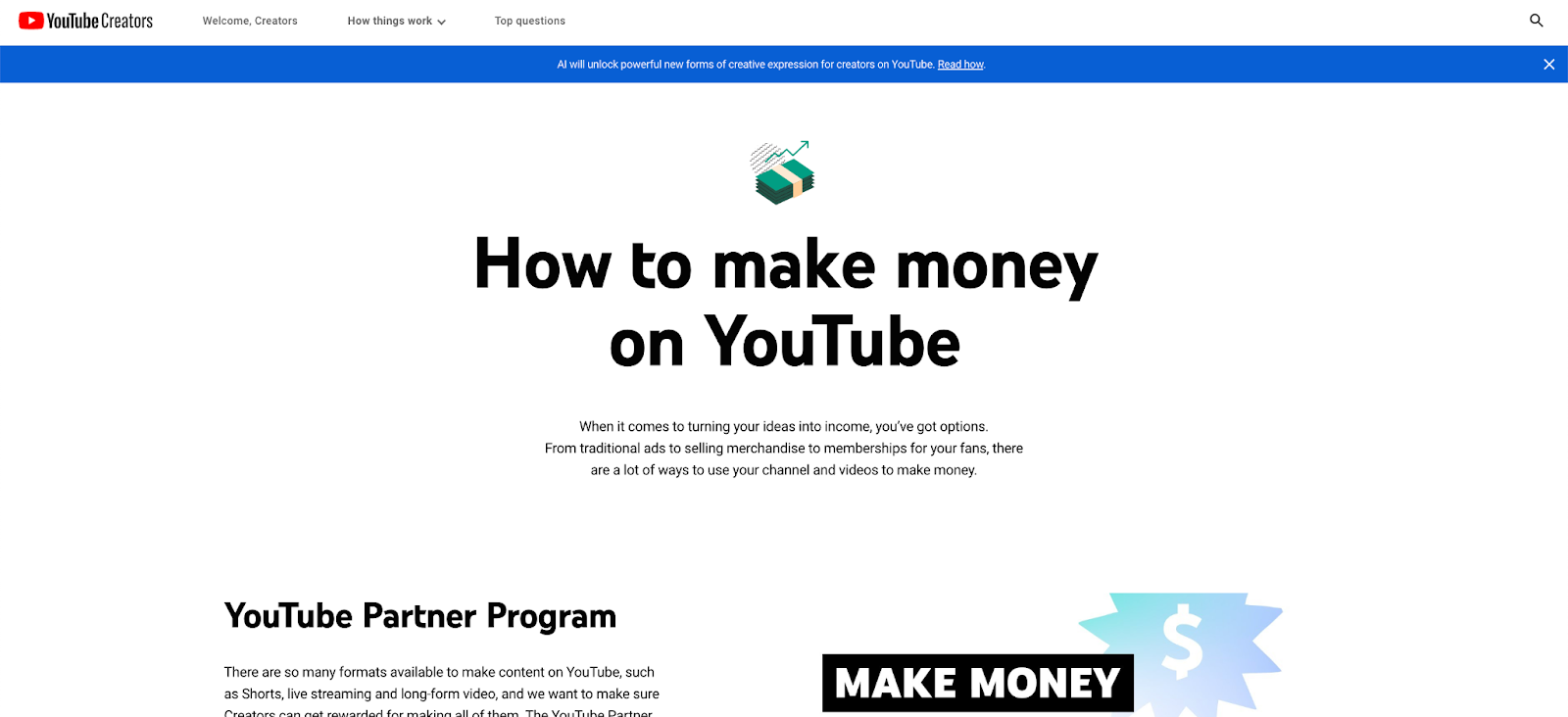
“Being a YouTuber isn’t a real job!”, I hear you cry. I can’t argue with that, but the potential earnings can. Get an average of 30,000 views per day across your channel and you’ll make between $1,680 to $2,800 per month. And it only increases from there.
Being a vlogger is extremely flexible too and opens lots of doors to collaborations and paid opportunities. But, it’s far from easy with the average YouTuber working 30 to 60 hours a week when putting on daily content.
You could also consider Twitch streams, which require live and often multi-hour shows, but without the need for post-production editing like with YouTube.
Vloggers can also maximize their income via revenue streams such as affiliate marketing and sponsorships. As a YouTuber you can maximize your income with Whop by selling digital products or putting exclusive content behind paid subscriptions.
- Do YouTube shorts really make money? Find out how much here
- How to become a YouTuber & earn money with online video content
- YouTube channel ideas that can make you money online
18. Software engineer

Every business considers creating an app in today’s world, meaning there is always demand for a software engineer. Unlike many other creative fields, coding isn’t one that most people can quickly understand. So if you’ve got some HTML, CSS, and JavaScript skills, you could cash in.
Like a web developer, you’ll be working for clients to meet deadlines, but otherwise won’t be surveyed for when you clock in and out, or where you’re working. It’s just about results!
Being a software engineer can also be flexible in terms of what you work on, as you can find a niche to target and reject or accept job requests as you please. You can start finding clients on Upwork, Fiverr, and Contra.
19. Sales representative
Sales representatives work collaboratively, negotiating deals, cold calling, and giving presentations. That may sound demanding but the majority of sales representatives work remotely, part-time, or by commission - giving the freedom to avoid 9 to 5 routines and office environments.
Some sales reps are making six-figure sums as remote closers - just check that video above and learn how Alexis Seleste made $100k in 27 days.
Math, negotiation, communication, and customer service skills are a must, as is the need to travel. Sales representatives report working around 20 to 47 hours per week.
20. Data entry clerk

Data entry clerks can work remotely and around their time schedules, so long as they help their clients stay organized with data entries and data reports.
This is the kind of job where you’ll be spending time in front of your screen, but able to clock out and go run some errands, take the afternoon off, or have a coffee break as you want.
Try sites like Clickworker, Upwork, Indeed, and Fiverr to get started.
The average data entry clerk works around 35 to 40 hours per week full-time, and 20 to 30 hours part-time.
21. Reseller
Ever noticed how some people on eBay have like 3,000 reviews? That’s because they’ve made it into a full-time business. They buy products for a low cost and sell them at a higher price. It can be especially lucrative with vintage items or anything that you upscale.
It’s flexible too, as you’re the boss of your working hours, projects, and profit margins.
eBay, Depop, Vinted, and thrift stores are your friends to get started. You can then start a website or use a site such as Shopify to create an online storefront. Whop has plenty of reselling communities that teach you how to flip for profit.
22. Social media manager

Social media managers can work from their cellphones and laptops to manage social media accounts. Even when working full-time you can usually work remotely, but if you’re freelance then you can really gain total freedom when you’re actually working.
Your task is to boost your client’s online presence, following, and profits using social media posts, SEO, and emails. An understanding of data and marketing will be a big help.
You can find social media jobs on LinkedIn, Upwork, Fiverr, Contra, and Hubstaff Talent. To get the best results for your client, check out social media courses and communities on Whop that teach you how to grow and go viral.
The average full-time social media manager works 40 to 60 hours per week, with freelancers completing around 5 to 20 hours.
23. Bookkeeper

Bookkeepers can work when they want and where they want, for decent pay, as this is a much-needed role for businesses of any size.
The job requires you to take care of the client’s financial records while making reports and removing errors. There is no need to be on the clock, but just to get the job done.
Indeed, LinkedIn, Fiverr, and Upwork often have bookkeeping jobs.
Full-time bookkeepers work around 40 hours per week, and 20 to 30 hours per week when part-time or freelance.
24. Photographer
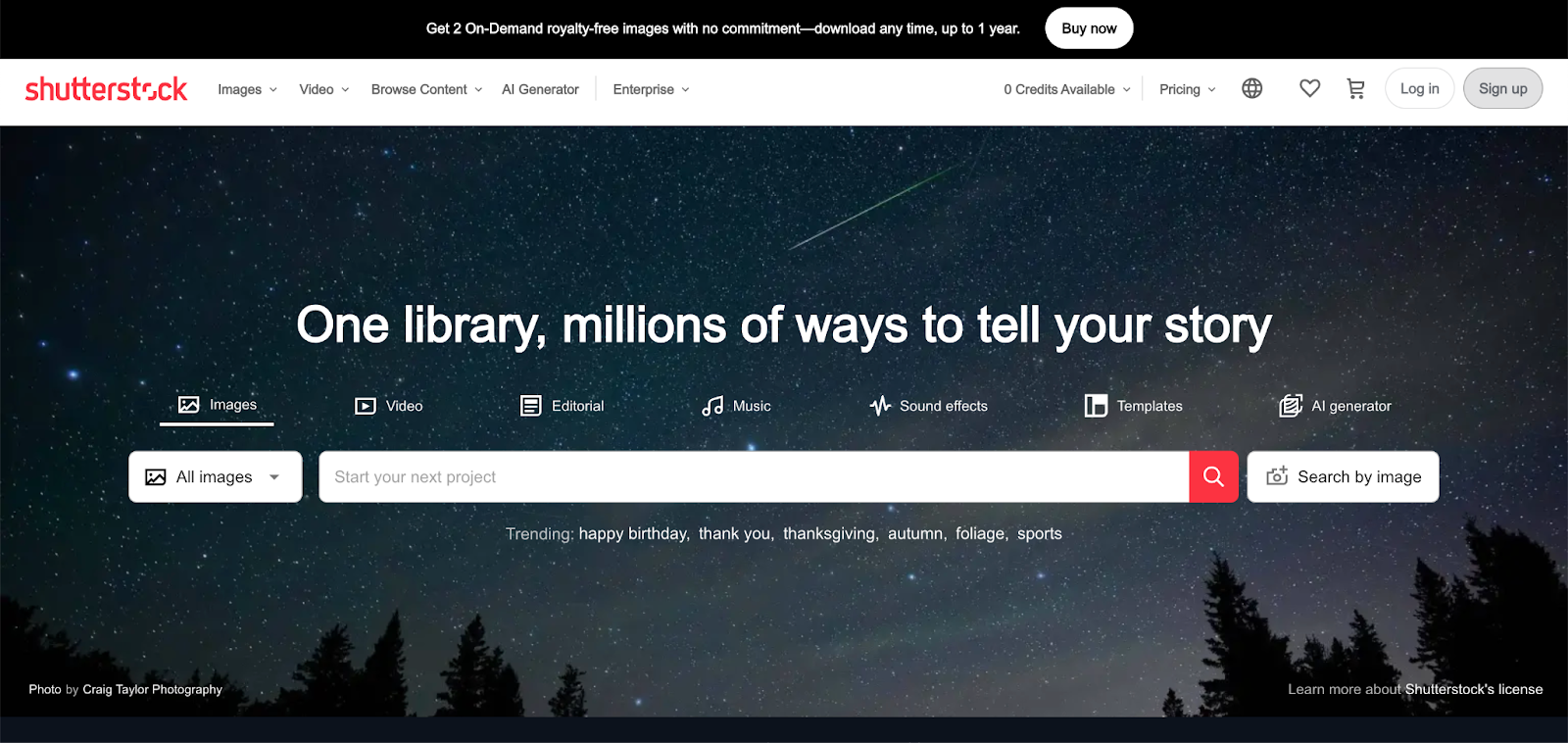
The life of a photographer can be an exciting one, as it takes you to events, weddings, and interesting environments. There is also often large flexibility, as you can accept and reject clients as you please.
You’ll also be spending a large amount of your time editing photos, which means you can dictate when you want to stop every day.
You can also tap into various revenue streams such as stock photo selling and the sales of prints. Whop also enables you to sell photography courses and digital products.
You can sell your work on sites like Alamy, 500px, Shutterstock, Getty Images, iStock, Adobe Stock, and Unsplash.
On average, photographers work at least 30 hours a week to make a living.
25. Sell handmade products

You can become your own boss by starting a business selling your own crafted products. There will be no one asking you to do overtime or work at the office, as you create goods, market them, send them for delivery, and then collect the profits.
This is an ideal gig for people who like making DIY products like 3D-printed items, jewelry, and clothing. You can get started on sites such as Etsy, but be prepared to lose 6.5% of each sale in Etsy fees.
26. Serving or bartending

The food and drink industry often allows for flexible hours and is rarely a 9-to-5 job. That can be perfect if you want to work around your other commitments or passions. If you need more money, you should be able to increase your hours as you wish.
Serving or being a bartender is also a great alternative to most options in this list if you want to be out in the real world, meet new people, and engage your social skills. To get started, browse local job listings or ask directly at local bars or restaurants.
Bartenders often work 25 to 40 hours per week to make a living.
27. Consulting services

Consulting is a popular job as always - if you're an expert in any field, you can offer consulting services to big and small businesses and guide them in your field. One of the best parts of working as a consultant is that it can be very flexible.
Consultancy might sound like field work, but it doesn't have to be - many consultants work from home, especially ones that work with businesses that don't deal with physical goods. Some popular consultancy fields are marketing, technology, finance, cybersecurity, and sustainability.
Finding a field that closely matches your expertise will greatly enhance your chance of finding work. One of the best parts of working as a consultant is the low startup cost - you don't have to set up a charming website or rent an office. All you have to do is to make sure you stand out online. You can find consultancy jobs on platforms like LinkedIn, UpWork, and Contra.
The amount of hours consultants work heavily depends on the field they're working in - it starts from around 15 hours per week and goes up to 55+.
28. Become a proofreader

Like many freelance jobs, proofreading is one where you control the schedule and workload. Many proofreaders work from home, and the skills needed are very simple: you have to have a great understanding of the language you're proofreading in, good attention to detail, and proficiency in grammar and spelling.
Depending on the skill level, freelance proofreading rates range between $35 to $54, according to Fiverr. Just like any other freelancing jobs, having experience in the field you're proofreading for is a big plus - you will stand out more to clients.
UpWork, Fiverr, Freelancer, and LinkedIn are great places to find proofreading work. On top of this, joining communities of writers and proofreaders can be very beneficial in terms of improving yourself and finding work.
Full-time proofreaders usually work around 35 to 40 hours per week.
29. Manage communities

Community management has been around since the dot-com bubble. Started with forum managers and have now moved to platforms like Whop, Discord, and Reddit. Digital community management is inherently an online job, so you'll have the freedom to work from your home.
Since online communities tend to have members from all over the world, businesses and creators need community managers from different time zones - this means that you can select which hours you want to work. Based on the platform expertise you have, the opportunities will differ. Platforms like Whop and Discord have great markets for community managers.
As a community manager, you should have strong communication and interpersonal, conflict resolution, community engagement, and content planning skills. Your first and foremost duty will be to engage the members of your community and keep it safe.
Depending on the community size, type, and platform, the income of community managers will change. Freelance community managers usually earn from $15 to $60 and work for 40 to 50 hours per week.
- What is a community? Online communities explained
- Mastering community management: How to build and manage a thriving online space
30. Dog walking

Dog walking is one of the most flexible jobs you can start right away. One of the best parts of dog walking is that it has almost zero upfront costs - all you have to do is to sign up to the correct platforms and love dogs, which is pretty easy.
Dog walking can earn you from $12 to $31 per hour, according to Indeed. Wag Walking, Rover, and GoWalkies are some of the popular platforms you can sign up on as a dog walker and start getting jobs.
Since the schedule and work hours of dog walking are totally up to you, there is no set range of how many hours you would work per week - you're in control of it.
How to find flexible jobs
By now, you likely have an idea in mind - here's how to make that idea a reality.
Decide on your niche
First, you need to commit to a niche. That means taking a job or idea (like those listed above) and narrowing it down a little. So, if you’re selling crypto courses, you could focus on crypto courses for newbies. Or, if you’re dropshipping, you could target alternative teen clothing.
If you try to target everyone, you’ll actually target no one, as you won’t look like you have expertise in any roles, and your audience will be too broad.
To decide upon a niche, consider what you enjoy, what you’re skilled at, and what you believe has a realistic chance of making you the income you need.
Level-up your skillset
If you’re looking to make money fast, then go for a job and niche that you’re already reasonably well skilled in.
But regardless, it’s a good idea to brush up on your subject knowledge before you go applying for jobs or trying to create products.
For example, if you’re going to be a content writer, then gaining an understanding of SEO is essential.
Whop is home to thousands of courses and communities in just about anything you could imagine, from sailing advice to ecommerce education, remote sales to digital marketing. Head to Whop and find the right whop for you.
Create a portfolio
Next, it’s time to create a portfolio to showcase what you can do. But how can you make a portfolio if you haven’t had any clients yet?
The answer is by making some spec-copy examples! You can even use real companies here to show what you could do if you were hired by them. For example, if you’re a graphic designer, you could make a new logo for eBay. Or, you could just create an imaginary company and go from there.
Just make sure you show off what you do best. Once you’ve got some clients under your belt, you can add the work to your portfolio.
Create a resume (or an online presence)
I know - creating a resume is never fun. But making one now is going to save you the headache of worrying about it later. Even in the flexible and freelance job world, some businesses like to see a resume to understand your skills and experience.
You can use sites like Canva to use pre-existing resume templates to speed up the process. Sites like Resume.com and TopResume can be useful if you’re looking for professional feedback.
Start searching for work
You're now ready to find paid work. Here are a few different ways you can start your search.
Sign up for freelancing sites
If you’ve picked a freelancing job rather than self-employment, start by signing up to freelancing sites like Fiverr and Upwork. Fiverr is best for one-time order jobs, while Upwork is better suited to more complex, long-term projects. There are also countless industry-specific freelancing sites, which you can find with a quick Google search.
You should create a profile that highlights your skills and experiences and list services or gigs that clients can order for a realistic price. You should also start applying to jobs; it can take some consistent effort, but once you build up a rating, you’ll find it easier.
You should also browse job boards like FlexJobs, but they tend to be very competitive.
Create a LinkedIn account and start networking
LinkedIn is a social media site for professionals and businesses. Here, you can start to build a reputation and gain connections that help you earn some legitimacy in your field. Finding work via referrals is really common, and LinkedIn is of great help with that.
Even having a mutual ‘connection’ with a recruiter can be of significant help. You don’t have to post every day, but when you complete a new project, you can add it to your experiences and let the world know about your new success.
I’d just warn you to not let what you read on LinkedIn get to your head. It’s often full of people projecting, posing, and frankly lying about their earnings, success, and struggles.
Ask friends and family
If you’re struggling to get the ball rolling, ask around those you know to see who would be interested in your service. Perhaps someone knows an uncle or friend who needs a new website for their business or could do it with a virtual assistant.
Sure, they might not be your dream client, but you can add the project to your portfolio and potentially gain a referral
Cold email
Start emailing potential clients with a brief proposal of your work. Be direct and polite. They won’t have the time to read an essay; you should tell them who you are, what you do, your experience level, and what you can do to help them.
‘Warm’ emailing is also an alternative strategy, where you ask them if you could be kept in mind for future projects, if now isn’t the right time.
Consider ads
Depending on the niche, ads can help a business get off its feet - especially if you’re selling digital or physical products. Google, Instagram, Facebook, LinkedIn, TikTok, and X all permit ads and can operate within your pre-defined budget.
Work when you want jobs: How to fit flexible work around your schedule

Whatever your need to get a more flexible job is, you need to try and adapt it to your schedule. This requires discipline and boundaries. Here’s some tips to help you out:
Determine how many hours you need to hit your targets
Don’t make the mistake of over or underestimating how many hours you need to work. If you do, you might end up struggling financially or failing to achieve flexibility at all.
Take some time to determine how many hours per week you need to put in to make your work a success - including considering per-hour rates, and how many hours it takes to design a product, or complete a service.
Create a schedule
Next, create your ideal schedule. Doing so will help you understand where you can be flexible and where you can’t. For example, are there any hours you absolutely must work (such as due to meetings or conference calls)? Or, are there hours you need free, such as to take care of the kids or focus on your art projects?
Follow deadlines
Whether you’re a freelancer or selling digital products, you’ll have deadlines. Sticking to them will make your job a success. Making note of them can help you prioritize your tasks, and ensure that your freedom isn’t impaired by last-minute all-nighters.
Transition slowly
If you’re coming from a full-time job, the transition may be abrupt. Consider adjusting your schedule slowly, so you can stay on top of things and find the most comfortable rhythm. For example, perhaps you’ll commit to designing digital products on a Monday and Tuesday only first, before going full-time later on.
Communicate clearly
Let those you live with and work with know about your new schedule - just because you’re working from home doesn’t mean you can be interrupted constantly.
You’ll also need to learn to stick to your set working hours, to avoid clients taking advantage of your newfound freedom.
The most flexible way to earn money online? Digital products and Whop
Selling digital products is arguably the most flexible job around, as it provides passive income and no need to worry about manufacturing or delivery.
Think about it - you can make a digital product once and sell it again and again and again.
Worried about your technical skills? Don't be. With PLR digital products (digital products that you buy and update with your branding) you don't even have to create what you're selling. Just purchase, customize, and start making money.
Whether you want to earn money while you sleep by selling online courses and ebooks or want a more hands-on role like running an online community or selling virtual coaching services, you can do it all with Whop.
Create your whop and start making money on your terms. Whop sellers are making anywhere from $2000 to $250,000 dollars a month on their own time - why not join them?
Work when you want by selling with Whop today.



